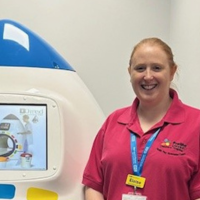
 January 2024
January 2024
What is your current role?
I'm a senior health play specialist supporting children who are having procedures (tests or scans) in our radiology service, for example, ultrasounds or MRI scans.
How long have you been a health play specialist at Evelina London?
I've been a play specialist at Evelina London for over 5 years. I've focused on supporting children who are having procedures in imaging for 3 years.
How do you support children who are having diagnostic tests, such as ultrasounds, CT scans, fluoroscopy and MRI scans?
My main role is supporting patients who are having procedures. I help them prepare for anything they may see, feel, or experience by using resources tailored to their age and developmental level. This can involve looking at images of the area or equipment and using role play to help them make sense of what will happen, share any worries and ask any questions.
I use distraction in various departments to minimise any distress and help them cope with the experience.
I sometimes contact families before they come to hospital to offer my support and plan how best to support their child. I talk to the family, supply them with social stories (a social learning tool) and sometimes work with their child's school. I make sure that their child's needs are at the heart of the plans we pull together with the family and share these plans with the other members of the team involved in the child’s care.
I also take individual referrals for children that the teams think may need further support.
Why is play so important for children having tests or scans?
Play is a normal part of childhood. By allowing children the opportunity to play, we can build a connection with parents and the child or young person. Play breaks down the barriers that some children may experience from being in hospital and can help them forget about their upcoming procedure for a moment.
When children engage in play activities we create a positive distraction, making them more comfortable and less intimidated by what's happening. Also, it provides a way for me to build rapport and establish trust with young patients, ultimately improving their overall wellbeing during the radiology process.
What does a typical day look like for you?
Every day is different, and can vary from therapeutic play preparation to distraction, talking with families before they bring their child for their appointment, developing social stories for children or young people who may benefit from one, or supporting individual referrals for other areas.
As a student link I also support students to become play specialists. I meet with them to make sure they feel supported and get the experience they need to be able to meet their competencies.
What do you enjoy most about your role?
I most enjoy interacting with patients and supporting them from start to finish through something they may be scared of, and seeing the change when they have managed it.
I love how varied my role can be and advocating for our role across children's and adult's services, educating nursing and radiographer students about our role.
What would you say to families who may be worried their children are scared about having scans at Evelina London?
Please speak to your child's doctors or nurse specialists who will be able to refer you to the play service for support.
We have easy-to-access resources on our website to help children and young people prepare for an MRI too.
What are you most proud of?
Seeing my student grow and develop in confidence and become a qualified registered health play specialist, working with other families and supporting them through their care.
Seeing the impact my support has had on children achieving their scans.
Being part of the wider team working together to support children and make their experience at Evelina London a positive one.

Thank you to the children and young people who have so brilliantly illustrated our blog pages.